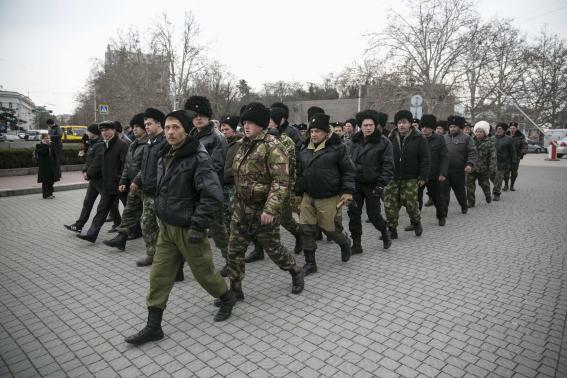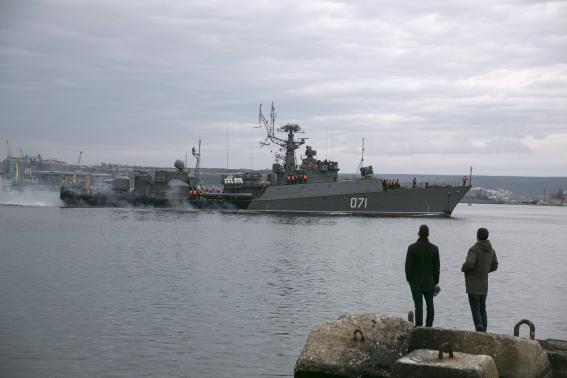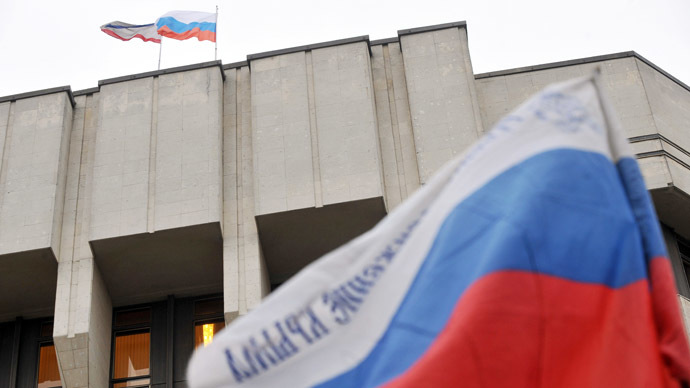www.aljazeerah.info
News, March 2014
Archives
Mission & Name
Conflict Terminology
Editorials
Gaza Holocaust
Gulf War
Isdood
Islam
News
News Photos
Opinion Editorials
US Foreign Policy (Dr. El-Najjar's Articles)
www.aljazeerah.info
|
Editorial Note: The following news reports are summaries from original sources. They may also include corrections of Arabic names and political terminology. Comments are in parentheses. |
Russian Forces Enter Republic of Crimea, Obama Calls Putin for 90 Minutes, NATO Angry
March 2, 2014
 |
 |
| Crimean and Russian Cossack volunteers arrive to help local police, March 2, 2014 | Crimean local women pose in photos with local pro-Russia soldiers, March 2, 2014 |
 |
 |
| Russian navy ship in enters the Crimean port of Sevastopol, March 2, 2014 | Russian flags on top of the Crimean Parliament building in Simferopol, March 2, 2014 |
Sort out who’s boss in Kiev, Crimea takes care of itself – republic’s parliament speaker
Russia TV, March 02, 2014, 10:58
Ukraine’s autonomous republic of Crimea wants Kiev to stay out of its business, and put its own house in order first, the Crimean parliament speaker has said, adding that local authorities can meanwhile take care of local business.
“You in Kiev sort it out between yourselves, and we will deal with the republic’s problems,” Vladimir Konstantinov told a news conference.
The top priority for Crimean authorities is to hold a referendum on whether it should have greater autonomy, the speaker said. Such a referendum has been scheduled for March 30.
Konstantinov said the self-proclaimed government in Kiev discredited itself by breaking an agreement it signed with ousted President Viktor Yanukovich. It started chaos in the country and is busy abruptly changing legislation instead of calming down the situation.
“The situation in southeastern Ukraine is very tense. People are trying to protect themselves. We all know what that Nazi gang [in Kiev] is capable of. I am sorry that respectable politicians in Kiev decided to settle their scores with the help of that terrible force,” he said.
Most of the Crimean law enforcement and military share this point of view, Konstantinov said. They also support the local self-defense forces, who are basically people who were scared for their lives and their families in the wake of the violence in Kiev and the anti-Russian gestures of the new authorities.
Konstantinov said Crimea would give asylum to anyone persecuted elsewhere in Ukraine for their political views and beliefs.
The speaker advised Kiev against using force to attempt to take control of Crimea or any other region resisting it. He said such a move would end with the new authorities having no region to call their own in Ukraine.
He thanked Russia for agreeing to help Crimea in a difficult situation.
“We turned to Russia for help in ensuring law and order, and providing financial aid in this difficult period. This request was granted. Now a working group in Moscow is talking about the technical details of this issue,” Konstantinov said.
The speaker declined to identify armed men in uniforms without insignia, who had been guarding key locations in Crimea for several days. Kiev alleges these are units of the Russian military invading Ukraine.
Konstantinov said that Crimea was part of “the Russian world” and does not welcome NATO. He also stressed that despite this pro-Russian leaning, the people of Crimea don’t have problems with Ukrainians, but have problems with radical nationalists and neo-Nazis, who played a big role in ousting President Yanukovich.
The speaker said the Crimea needs self-governance by an inclusive government, which would take into consideration the interests of all its people, be they Ukrainians, Russians or Tatars. The latter groups are a substantial minority in Crimea, and local Russians, being a minority in the whole of Ukraine, can sympathize with the Tatars, Konstantinov said.
“We are prepared to offer Crimean Tatars a level of authority that they never had before,” he said.
============================Ukraine mobilizes after Putin's 'declaration of war'
By Natalia Zinets and Alissa de Carbonnel
KIEV/BALACLAVA, Ukraine Sun Mar 2, 2014 12:41pm EST
(Reuters) -
Ukraine mobilized for war on Sunday and Washington threatened to isolate Russia economically, after President Vladimir Putin declared he had the right to invade his neighbor, creating Moscow's biggest confrontation with the West since the Cold War.
"This is not a threat: this is actually the declaration of war to my country," Ukraine's Prime Minister Arseny Yatseniuk, head of a pro-Western government that took power when Russian ally Viktor Yanukovich fled last week, said in English.
Putin obtained permission from his parliament on Saturday to use military force to protect Russian citizens in Ukraine, spurning Western pleas not to intervene.
Russian forces have already bloodlessly seized Crimea - an isolated Black Sea peninsula where Moscow has a naval base. On Sunday they surrounded several small Ukrainian military outposts there and demanded the Ukrainian troops disarm. Some refused, leading to standoffs, although no shots were fired.
Russia has staged war games with 150,000 troops along the land border, but so far they have not crossed. However, pro-Russian demonstrators have marched in the east of the country and have raised Russian flags over government buildings in several cities, in what Kiev says is a move orchestrated by Moscow to justify a wider invasion.
Ukraine's security council ordered the general staff to immediately put all armed forces on highest alert.
The Defense Ministry was ordered to stage a call-up of reserves - theoretically all men up to 40 in a country with universal male conscription, though Ukraine would struggle to find extra guns or uniforms for significant numbers of them.
U.S. Secretary of State John Kerry condemned Russia for what he called an "incredible act of aggression" and threatened "very serious repercussions".
"You don't just, in the 21st century, behave in 19th century fashion by invading another country on completely trumped-up pretext," Kerry told CBS program Face the Nation.
Kerry said Moscow still had a "right set of choices" to defuse the crisis. Otherwise, G8 countries and other nations were prepared to "to go to the hilt to isolate Russia".
"They are prepared to isolate Russia economically. The rouble is already going down. Russia has major economic challenges," he said. He mentioned visa bans, asset freezes and trade isolation as possible steps. A Kremlin spokesman declined to comment after Kerry's remarks.
THREAT TO EASTERN UKRAINE
At Kiev's Independence Square, where anti-Yanukovich protesters had camped out for months, thousands demonstrated against Russian military action. Speakers delivered rousing orations and placards read: "Putin, hands off Ukraine!"
"If there is a need to protect the nation, we will go and defend the nation," said Oleh, an advertising executive cooking over an open fire at the square where he has been camped for three months. "If Putin wants to take Ukraine for himself, he will fail. We want to live freely and we will live freely."
Of potentially even greater concern than Russia's seizure of majority ethnic Russian Crimea are eastern swathes of Ukraine, where most ethnic Ukrainians speak Russian as a native language.
Those areas saw more demonstrations on Sunday after violent protests on Saturday, and for a second day pro-Moscow demonstrators hoisted flags at government buildings and called for Russia to defend them. Kiev said Russia had sent hundreds of its citizens across the border to stage the protests.
U.S. President Barack Obama spoke to Putin for 90 minutes by telephone on Saturday after the Russian leader declared he had the right to intervene and quickly secured a unanimous yes vote from his parliament.
According to the Kremlin's account, Putin told Obama Russian speakers were under threat from Ukraine's new leaders, who took over after Yanukovich's security forces fired on huge protests against his rejection of a European trade deal in favor of closer ties with Moscow.
Ukraine, which says it has no intention of threatening Russian speakers, has appealed for help to NATO, and directly to Britain and the United States, as co-signatories with Moscow to a 1994 accord guaranteeing Ukraine's security.
NATO ambassadors met in Brussels to discuss next steps. Secretary General Anders Fogh Rasmussen accused Russia of threatening peace and security in Europe.
SYMBOLIC RESPONSE
Washington has proposed sending monitors to Ukraine under the flags of the United Nations or Organization for Security and Cooperation in Europe, bodies where Moscow would have a veto.
So far, the Western response has been largely symbolic. Obama and others suspended preparations for a G8 summit in Sochi, where Putin has just finished staging his $50 billion winter Olympic games. Some countries recalled ambassadors.
Ukraine's tiny armed forces would be no match for the might of its superpower neighbor. Britain's International Institute of Strategic Studies estimates Kiev has fewer than 130,000 troops under arms, with planes barely ready to fly and few spare parts for a single submarine.
Russia, by contrast, has spent billions under Putin to upgrade and modernize the capabilities of forces that were dilapidated after the breakup of the Soviet Union. Moscow's special units are now seen as equals of the best in the world.
In Crimea, Ukraine's tiny contingent made no attempt to oppose the Russians, who bore no insignia on their uniforms but drove vehicles with Russian plates and seized government buildings, airports and other locations in the past three days.
Kiev said its troops were encircled in at least three places. It pulled its coast guard vessels out of Crimean ports. Ukraine said its naval fleet's 10 ships were still in Sevastopol and remained loyal to Kiev.
Scores of Russian troops with no insignia were camped outside a base of Ukrainian troops at Perevalnoye, on a road from Crimea's capital Simferopol towards the coast.
A representative of the base commander said troops on both sides had reached agreement so no blood would be shed.
"We are ready to protect the grounds and our military equipment," Valery Boiko told Reuters television. "We hope for a compromise to be reached, a decision, and as the commander has said, there will be no war."
Igor Mamchev, a Ukrainian navy colonel at another small base outside Simferopol, told Ukraine's Channel 5 TV that a truckload of Russian troops had arrived at his checkpoint and told his forces to lay down their arms.
"I replied that, as I am a member of the armed forces of Ukraine, under orders of the Ukrainian navy, there could be no discussion of disarmament. In case of any attempt to enter the military base, we will use all means, up to lethal force.
"We are military people, who have given our oath to the people of Ukraine and will carry out our duty until the end."
A unit of Ukrainian marines was also holed up in a base in the Crimean port of Feodosia, where they refused to disarm.
Elsewhere on the occupied peninsula, the Russian troops assumed a lower profile on Sunday after the pro-Moscow Crimean leader said overnight that the situation was now "normalized".
Putin's justification - the need to protect Russian citizens - was the same as he used to launch a 2008 invasion of Georgia, where Russian forces seized two breakaway regions.
In Russia, state controlled media portray Yanukovich's removal as a coup by dangerous extremists funded by the West and there has been little sign of dissent with that line.
PROTESTS IN EAST
So far there has been no sign of Russian military action outside Crimea, but Kiev officials accused Moscow of being behind the pattern of violent protests in eastern cities.
Pro-Moscow demonstrators flew Russian flags on Saturday and Sunday at government buildings in cities including Kharkiv, Donetsk, Odessa and Dnipropetrovsk. In places they clashed with anti-Russian protesters and guards defending the buildings.
Ukrainian parliamentarian Hrygory Nemyriya, a spokesman to foreign journalists for the new authorities, said the pro-Moscow marchers were sent from Russia.
The worst violence took place in Kharkiv, where scores of people were hurt on Saturday when thousands of pro-Russian activists, some brandishing axe handles and chains, stormed the regional government and fought pitched battles with a smaller number of supporters of Ukraine's new authorities.
In Donetsk, Yanukovich's home city, the local government building was flying the Russian flag for the second day on Sunday. The local authorities have called for a referendum on the region's status, a move Kiev says is illegal. A pro-Russian "self-defense" unit held a second day of mass protests, attracting about 1,000 demonstrators carrying Russian flags.
Ludmila Petrova, 35, described the new authorities in Kiev as "slaves of the European Union" and said she favored Putin's declaration of the right to intervene.
"Maybe this will stop the hotheads in Kiev from bringing war to the Don basin and the Crimea. Maybe now they will think there is someone willing to defend these people."
(Additional reporting by Peter Graff, Sabina Zawadzki, Pavel Polityuk, Timothy Heritage and Stephen Grey in Kiev, Lina Kushch in Donetsk, Peter Apps in London, Steve Holland and Phil Stewart in Washington and Lou Charbonneau at the United Nations; Writing by Peter Graff; editing by Philippa Fletcher)
Fair Use Notice
This site contains copyrighted material the
use of which has not always been specifically authorized by the copyright
owner. We are making such material available in our efforts to advance
understanding of environmental, political, human rights, economic,
democracy, scientific, and social justice issues, etc. We believe this
constitutes a 'fair use' of any such copyrighted material as provided for
in section 107 of the US Copyright Law. In accordance with Title 17 U.S.C.
Section 107, the material on this site is
distributed without profit to those
who have expressed a prior interest in receiving the included information
for research and educational purposes. For more information go to: http://www.law.cornell.edu/uscode/17/107.shtml.
If you wish to use copyrighted material from this site for purposes of
your own that go beyond 'fair use', you must obtain permission from the
copyright owner.
|
|
|
|
||
|
||||||


